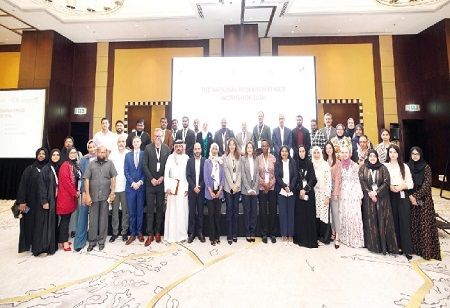The Ministry of Public Health (MoPH) recently hosted the National Health Research Ethics Workshop 2024, focusing on the use of artificial intelligence (AI) in health research. The event was organized in collaboration with the National Cyber Security Agency (NCSA), Qatar University (QU), and Hamad Bin Khalifa University (HBKU).
The workshop explored the latest global developments in the use of artificial intelligence in health research, data management, and national policies. It featured a range of sessions delivered by local and international experts in biomedical and health research, with representatives from 20 relevant institutions in Qatar participating.
This collective effort underscores a shared commitment to advancing health research standards.
The workshop also addressed emerging trends in the governance of medical AI, balancing innovation with privacy in AI healthcare applications in Qatar, AI in medical devices, ethical collaboration in health research, ethical and religious perspectives on AI use in medicine, and the integration of AI into clinical practice.
The primary goal of the workshop was to highlight the ethical considerations related to the use of AI in health research, data management, and national policies. It aimed to ensure the safe and ethical implementation of AI, adhering to the highest global standards.
Additionally, the workshop aimed to enhance the knowledge and skills of local researchers and professionals in health research, contributing to the growth and quality of Qatar’s research and development sector, and reflects a strong commitment towards aligning technological advancements in AI with ethical principles and international best practices.
In her opening speech, Dr Alexandra Haddad, Senior Research Grants Specialist at the Health Research Regulatory Department at the MoPH, stated, “The annual National Health Research Ethics Workshop contributes to raising awareness among local researchers in the State of Qatar on the importance of health research ethics. It also reviews regulations governing health research and establishes ethical principles for AI use in health research”.
Dr Haddad also highlighted the Health Research Regulatory Department’s mission to educate and empower all stakeholders in the health research field through this annual workshop and other initiatives. The department is also responsible for proposing, developing, and amending legislative tools, policies, and regulations related to health and medical research to foster a safe and progressive research environment.
Furthermore, it oversees and monitors health research activities in Qatar.
The workshop saw the participation of around 250 attendees, including researchers, members of Institutional Animal Care and Use Committees (IACUCs), Institutional Review Boards (IRBs) overseeing human research, and Institutional Biosafety Committees (IBCs) from Qatar. It also welcomed healthcare professionals such as doctors, nurses, dentists, pharmacists, allied health professionals, and practitioners of complementary medicine, along with university and secondary school students preparing for higher education, as well as other stakeholders from Qatar's research and development sector.

